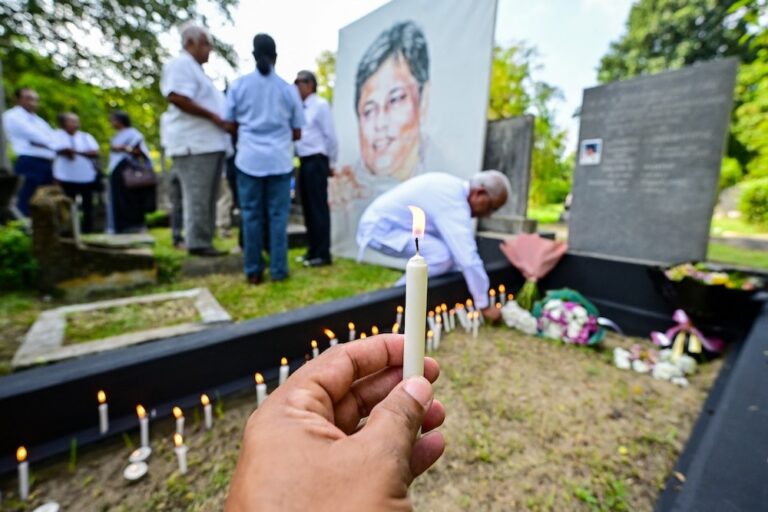**Updates IFEX alerts of 6 January 2000, 10 September, 8 September and 19 July 1999** (FMM/IFEX) – The following is a FMM press release: The Free Media Movement (FMM) is extremely concerned by the unprecedented attack on the independent privately owned media in Sri Lanka by President Chandrika Kumaratunga. In a three hour discussion on […]
**Updates IFEX alerts of 6 January 2000, 10 September, 8 September and 19 July 1999**
(FMM/IFEX) – The following is a FMM press release:
The Free Media Movement (FMM) is extremely concerned by the unprecedented attack on the independent privately owned media in Sri Lanka by President Chandrika Kumaratunga. In a three hour discussion on State television the President accused the independent media of “ganging up” against her and said she would no longer tolerate such criticism.
The President also launched a vicious attack on owners of media organisations and editors of all independent newspapers by name, threatening to take every action possible other than killing them.
The President’s remarks and the tone in which she made them are a clear indication that the government is planning to bring in new laws to further restrict media freedom and freedom of expression.
The FMM condemns the defamatory statements against journalists made by the President hiding behind the immunity granted to her by the Constitution.
The President’s outburst was preceded by senior ministers and officials of her government and the state owned print and electronic media launching a relentless hate campaign against the independent media since the government’s election victory three weeks ago.
In any democracy the media is not merely an instrument of disseminating information to the public but also plays the role of watchdog. In playing that role the independent media continuously come into conflict with those wielding power. It is also the responsibility of the media to highlight corruption, mismanagement and bad governance.
It is an accepted norm in any democratic society that those who hold public office come under closer scrutiny than others and a prerequisite to holding public office is the ability to tolerate criticism.
The FMM would also like to point out that Sri Lanka has more legal protection than most countries in the world to those who feel they have been wronged by the media such as the Press Council and criminal and civil defamation laws.
To further strengthen the rights of those who cannot afford legal remedy the Free Media Movement, the Editor’s Guild of Sri Lanka and the Sri Lanka Publishers Association are finalising plans to set-up a voluntary Press Complaints Commission (PCC), in line with such institutions in England and South Africa. The three organisations are also discussing the setting up of a media training institute to improve the professional standards of journalists.
At the dawn of a new millennium when the rest of the world is shifting the emphasis from cold war politics and totalitarianism to greater democratic freedoms it would indeed be sad to see our country drifting back to the dark days of elected dictatorships intolerant of criticism.
Waruna Karunatilake Sunanda Deshapriya
Convenor FMM Secretary FMM
Background Information
The government of President Chandrika Kumaratunga has been on a collision course with the independent privately owned media for the last few years.
Although she came to power in 1994 on a platform of democratic reforms which included wide ranging reforms in the media sector, the government instead took a confrontational path, especially after the media exposed the unprecedented rigging of a local election in January 1999.
Soon after President Kumaratunga won a second term on 21 January, state owned media intensified its campaign against journalists who were critical of the government and media institutions perceived to be against the government. This campaign was led by senior ministers and officials in the government. Soon after the election victory, the director of the Presidential Security Division (PSD), Superintendent of Police Karunaratna told FMM convenor Waruna Karunatilake that the editor of the “Sunday Leader” newspaper, Lasantha Wickramatunga, was number one on their hit list, followed by the editor of “Ravaya” newspaper, Victor Ivan. The FMM convenor was the third person on their list. The government has acknowleged that PSD was responsible for the brutal attack on journalists covering an opposition protest on 15 July 1999 and is suspected of carrying out the murder of “Satana” editor Roland Kumar. The PSD has also allegedly been involved in a series of other similar incidents and is feared by everybody for its ability to carry out extrajudicial acts with impunity. Government ministers have also pressured media institutions to stop television talk shows and columns in newspapers that were critical of the government. The president’s warning that she would not tolerate any criticism and would take all steps other than “killing” to counter such criticism has created a climate of fear among journalists and owners of media institutions.
Recommended Action
Send appeals to the president:
– protesting these recent attacks on the independent media
– urging her to ensure that the journalists’ cases are investigated thoroughly, and that the results of these investigations are promptly made public
Appeals To
APPEALS TO:Her Excellency Chandrika Bandaranaike Kumaratunga
President, Democratic Socialist Republic of Sri Lanka
Presidential Secretariat
Colombo-1
Sri Lanka
Fax: +94 1 333 703
E-mail: for_min@sri.lanka.netAlso appeal to foreign freedom of expression groups to lobby their governments to use diplomatic channels to express their concern.
Please copy appeals to the source if possible.


